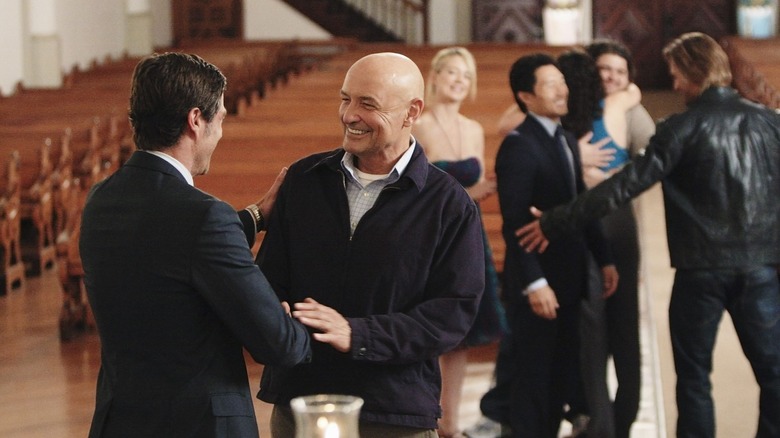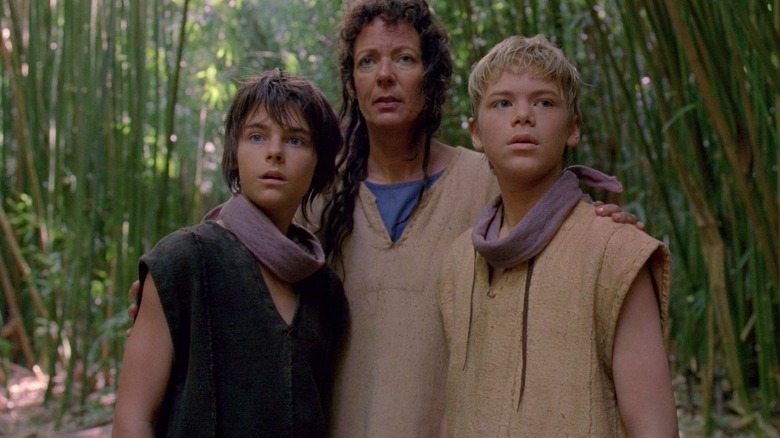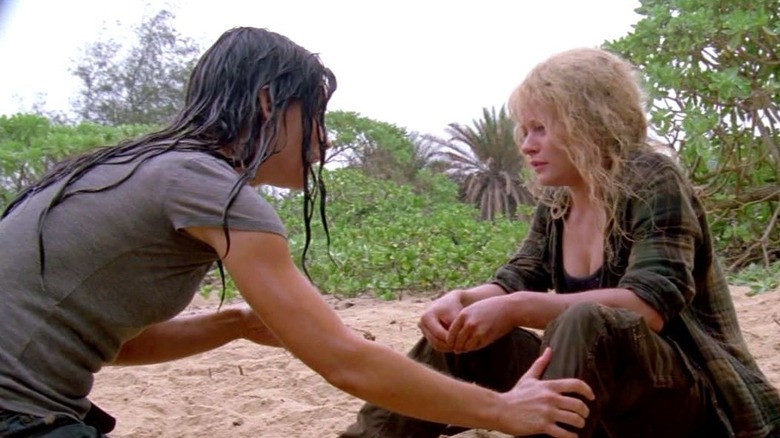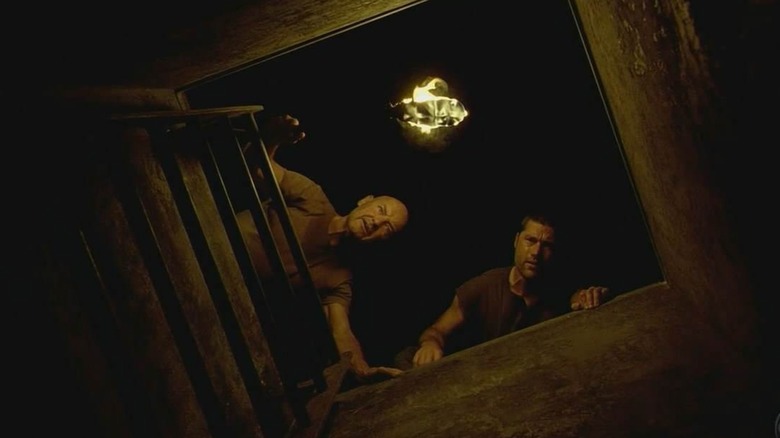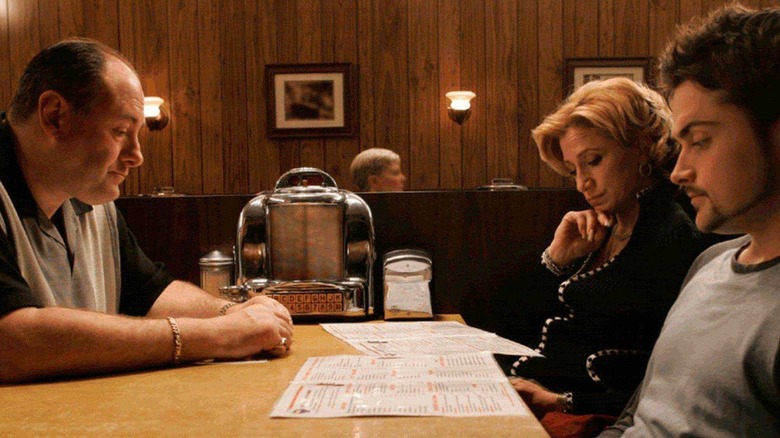Lost's Writers Knew No Version Of The Finale Could Please All The Fans
The backlash to the "Lost" finale wasn't quite as heavy or as universal as what "Game of Thrones" would provoke nine years later, but it was enough to ruin the show's reputation for a long time. After "The End" was released in May 2010, the narrative around "Lost" now seemed firmly set in stone: this was that show where the writers just made stuff up as they went along, where they kept promising pay-offs that could never be delivered. Throughout the 2010s, if a TV critic wanted to speculate that a show was becoming too aimless, too dragged out, they'd often phrase the question as, "Is this show turning into the new 'Lost'?" The claim that the finale was a massive disappointment was something that didn't even need to be backed up in most circles; it was just accepted as common sense.
For creators Damon Lindelof and Carlton Cuse, this reaction seemed unavoidable, at least to some extent. Talking to the Independent in a 2020 interview, Cuse explained, "When we started writing the finale, we were having breakfast in my office, and I said, 'Look, there's no version of the finale that everyone is going to embrace, particularly with a show like this where there are so many mysteries."
What not to do
As most can agree, "Lost" was not a show like "How I Met Your Mother," where there was a simple, expected ending available that wouldn't have ruffled many feathers. "HIMYM" could've ended straightforwardly with Ted meeting the mother and living happily ever after, but no one can really say how "Lost" should have ended; they just insist it should've been better than what we got.
Even for the showrunners, the easier part was figuring out not what they should do, but what they shouldn't: "Early on, we arrived at the fact that trying to answer all the unanswered questions was a recipe for disaster," Cuse explained. "It was didactic and uninteresting and actually, just as Damon has said, not true to life."
Sure enough, season 6 of "Lost" was at its least interesting when it was trying to provide answers. Fans claimed they wanted all the mysteries solved, but when an episode like "Across the Sea" came along — an episode that was basically a 40-minute explanation of Jacob and the Man in Black's backstories — it largely fell flat, often being considered one of the worst episodes of the final season. Maybe audiences didn't actually know what they wanted from the show, or maybe the explanations "Lost" had to offer simply weren't that good, but either way, the case was clear: a finale that just focused on tying up every loose end wouldn't have been well received either. Instead, "Lost" focused on what it was always best at: the characters.
Everyone gets a worthy send off
"Lost" was filled with tragic, devastating moments that stuck with viewers long afterward, and the final season followed up on those moments in ways we never would've expected. For instance, wasn't it frustrating how Hurley had a budding relationship with Libby in season 2, only for it to be cut short by Libby's sudden death? Wasn't it frustrating how Charlie sacrificed his life to ensure that Claire would be safe, only for Claire to lose her son and never be rescued from the island anyway? Didn't it sting how Jin never got to meet his daughter?
Well, season 6 follows up on all of these characters, giving them the happily-ever-after the island itself denied them. All the couples who were tragically separated by death on the island have finally reunited, and everyone got some closure on something that's been bothering them throughout their lives.
In a way, it's kind of weird to see people complain about how unsatisfying the "Lost" finale was because those moments where the characters finally remember their real lives are some of the most cathartic, rewarding scenes in the entire series. I don't know how anyone can watch Claire and Charlie's reunion and not find it powerful, or not be moved as you watch Juliet remember both Sawyer and her own tragic death in the span of a few seconds.
You rarely hear people accuse the show of not giving its main characters proper send-offs because everyone generally agrees that the character arcs all ended on a strong note. The lack of explanations vastly overshadows the finale's (almost undeniably) strong character work, which is strange considering that "Lost" has always been a character study at its core.
When in doubt, blame the marketing
In a certain sense, "Lost" aired at exactly the right time: network TV with its 20+ episode seasons was going strong, and the rise of the internet allowed fans to connect with each other and talk about the show on a level never really seen before. The binge TV model was also not even close to becoming a thing yet, which meant viewers had to wait a week between every episode instead of getting it immediately.
But with each episode getting a week's worth of build-up, and with fans constantly coming up with crazier and more explosive predictions each week, it's easy to see how expectations got a little too high. We've seen this sort of thing again in a shorter time frame with shows like "Euphoria," "Yellowjackets," and "WandaVision," where a primarily young audience (who've grown fully used to the binge model) drove themselves crazy in the weeks of waiting, and constantly developing theories that were way more ambitious than what the character-focused shows were actually going for.
It didn't help that the marketing for "Lost" always focused on the mystery element, with promos constantly promising that all our questions could be one episode away from being answered. The show's flashback structure should've made it obvious that its main focus was on the character journeys, but the marketing and internet discussions encouraged viewers to look at it solely through a mystery box lens.
Received more favorably with time
Perhaps this is why fans who watch "Lost" today tend to enjoy the finale a lot more than viewers did back in 2010. When you can easily binge the whole show within a month or two, the mystery elements no longer feel quite as drawn out, and you're able to enjoy it a little more on its own terms. With no time between episodes, there's less opportunity for your expectations to spiral out of control.
Similar controversial finales of the 2000s like "The Sopranos," which ended with a mid-sentence cut to black, have also grown more respected over time. Like "Lost," this HBO mafia series was widely criticized for being drawn-out and lacking pay-off, especially with the 10-month gap halfway through its final season. Fans always expected something big to happen, but those game-changing moments were always few and far between. After all, "The Sopranos" was also more of a character study; for the writers, the question of "does Tony die at the end?" was less important than the question of whether Tony's life was worth living.
Both "Lost" and "The Sopranos" made the bold, divisive choice to prioritize the characters over the mysteries, and despite the backlash, both shows' writers stand by their choice. "Would I have done anything differently with the ending of the show? I don't think so," David Chase, the showrunner for "The Sopranos," told the New York Times in 2019. Carlton Cuse has shared similar sentiments about his own show (via Collider): "I wouldn't apologize either. I think the journey of 'Lost,' like life, has its flaws and blemishes, which may be perceived differently by different people. But in totality, I'm very proud of what we did."
